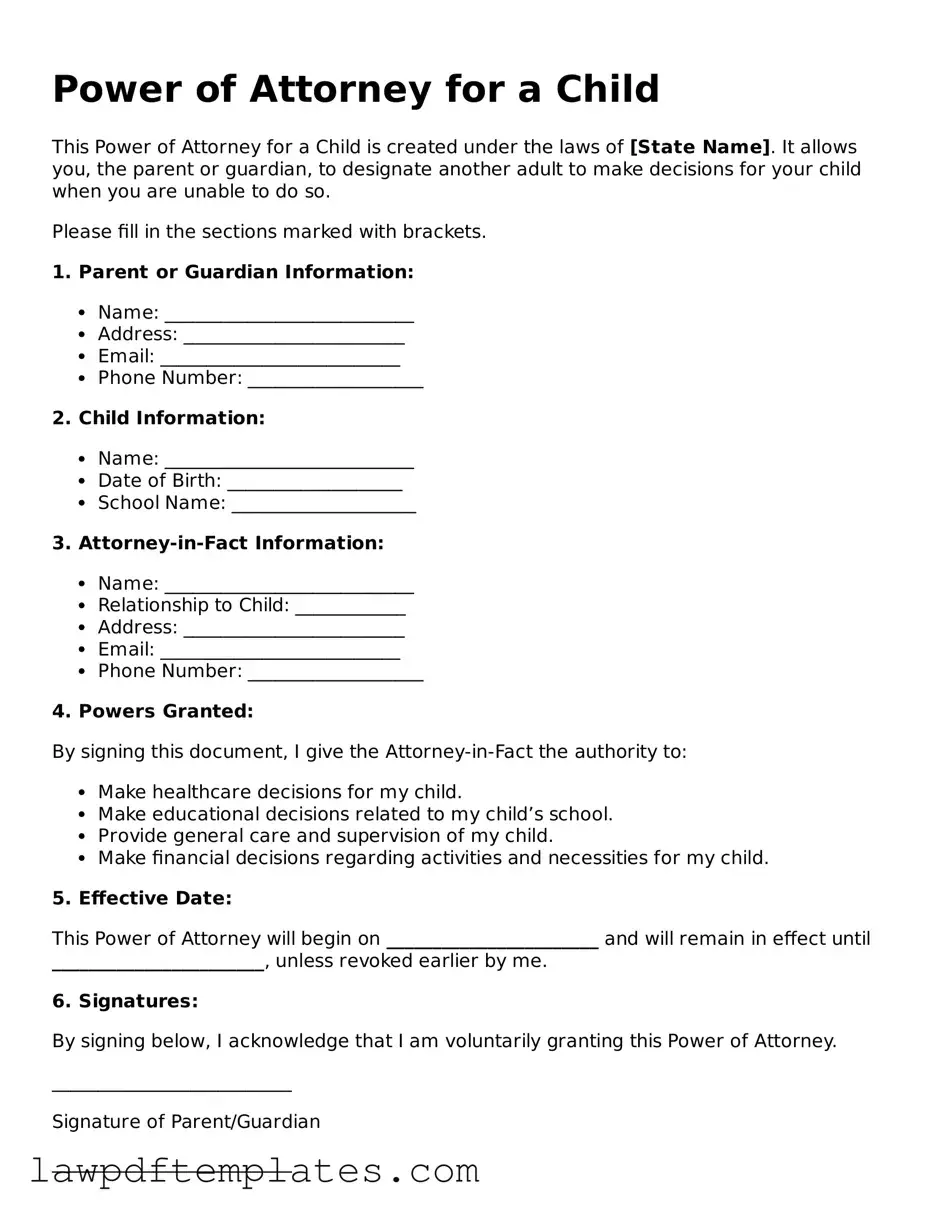Attorney-Approved Power of Attorney for a Child Document
State-specific Power of Attorney for a Child Forms
Form Breakdown
| Fact Name | Description |
|---|---|
| Purpose | A Power of Attorney for a Child allows a parent or guardian to grant temporary authority to another adult to make decisions on behalf of their child. |
| Legal Authority | The governing law for this document varies by state. For example, in California, it falls under the Family Code, while in Texas, it is governed by the Texas Family Code. |
| Duration | This document can specify a start and end date, or it can remain in effect until revoked by the parent or guardian. |
| Scope of Authority | The authority granted can include decisions about education, healthcare, and general welfare, depending on what is outlined in the document. |
| Notarization | Many states require the form to be notarized to ensure its validity and to prevent misuse. |
| Revocation | Parents or guardians can revoke the Power of Attorney at any time, provided they follow the correct legal procedures. |
| Importance | This form is particularly useful for parents who may be traveling, deployed, or otherwise unable to care for their child temporarily. |
Sample - Power of Attorney for a Child Form
Power of Attorney for a Child
This Power of Attorney for a Child is created under the laws of [State Name]. It allows you, the parent or guardian, to designate another adult to make decisions for your child when you are unable to do so.
Please fill in the sections marked with brackets.
1. Parent or Guardian Information:
- Name: ___________________________
- Address: ________________________
- Email: __________________________
- Phone Number: ___________________
2. Child Information:
- Name: ___________________________
- Date of Birth: ___________________
- School Name: ____________________
3. Attorney-in-Fact Information:
- Name: ___________________________
- Relationship to Child: ____________
- Address: ________________________
- Email: __________________________
- Phone Number: ___________________
4. Powers Granted:
By signing this document, I give the Attorney-in-Fact the authority to:
- Make healthcare decisions for my child.
- Make educational decisions related to my child’s school.
- Provide general care and supervision of my child.
- Make financial decisions regarding activities and necessities for my child.
5. Effective Date:
This Power of Attorney will begin on _______________________ and will remain in effect until _______________________, unless revoked earlier by me.
6. Signatures:
By signing below, I acknowledge that I am voluntarily granting this Power of Attorney.
__________________________
Signature of Parent/Guardian
__________________________
Date
__________________________
Signature of Attorney-in-Fact
__________________________
Date
Notarization:
This document must be notarized to be valid.
Common mistakes
Filling out a Power of Attorney for a Child form is a critical task that requires attention to detail. One common mistake people make is failing to specify the powers granted to the agent. It’s essential to clearly outline what decisions the agent can make on behalf of the child. Without this clarity, the agent may not have the authority needed to act in the child’s best interest.
Another frequent error is neglecting to include the child's full legal name. Using nicknames or abbreviations can lead to confusion and may cause issues when the document is presented in legal situations. Always ensure that the child's name matches the name on their birth certificate or other legal documents.
Many individuals also overlook the importance of signing the document in the presence of a notary public. This step is vital for the validity of the Power of Attorney. A notarized document carries more weight and is less likely to be challenged in court.
Additionally, some people forget to date the form. A missing date can raise questions about when the powers were granted and whether they are still valid. Always include the date to provide a clear timeline of authority.
When filling out the form, it’s crucial to provide complete contact information for both the agent and the parent granting the authority. Omitting phone numbers or addresses can create difficulties if the agent needs to be reached quickly.
Another mistake is not considering the duration of the Power of Attorney. Some people fail to specify whether the authority is temporary or permanent. Clearly stating the duration helps prevent misunderstandings and ensures that the agent's powers are appropriate for the situation.
People often forget to inform the child about the Power of Attorney. It’s important for the child to understand who will be making decisions on their behalf and why. This can help ease any concerns they might have about the arrangement.
In some cases, individuals may not seek legal advice before completing the form. Consulting with a legal professional can provide valuable insights and help avoid common pitfalls. This step is especially important if the situation is complex.
Lastly, failing to keep copies of the completed form can lead to complications down the line. Always make sure to retain copies for both the agent and the parent. This ensures that everyone involved has access to the necessary documentation when needed.
Consider Popular Types of Power of Attorney for a Child Documents
Real Estate Power of Attorney Template - A Real Estate Power of Attorney allows an individual to designate another person to manage their real estate transactions.
Utilizing a well-drafted Georgia Residential Lease Agreement is crucial for both landlords and tenants to ensure that all terms are clearly established and legally sound, reducing the likelihood of disputes during the rental period.
What Does Power of Attorney Cover - It ensures that someone can handle bills, investments, and property transactions for you.
